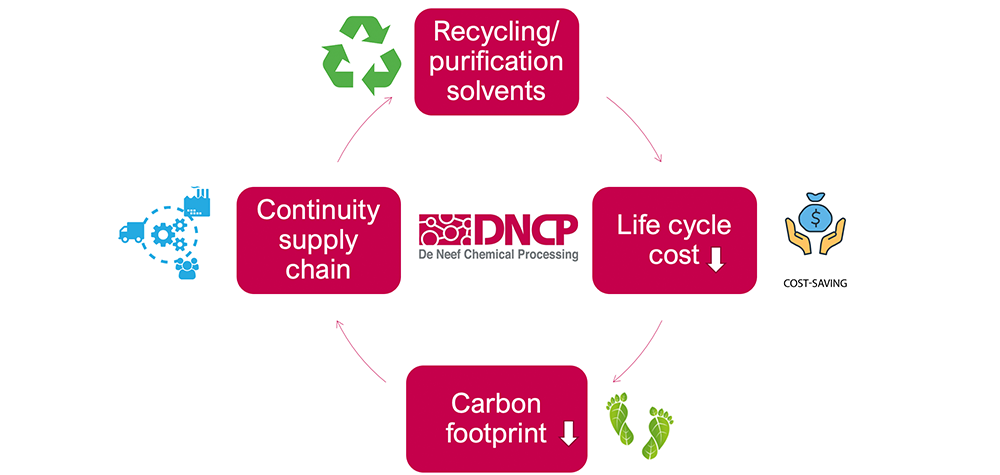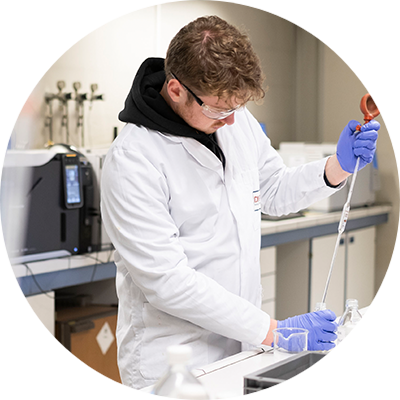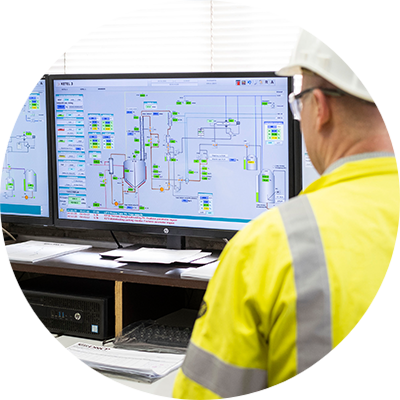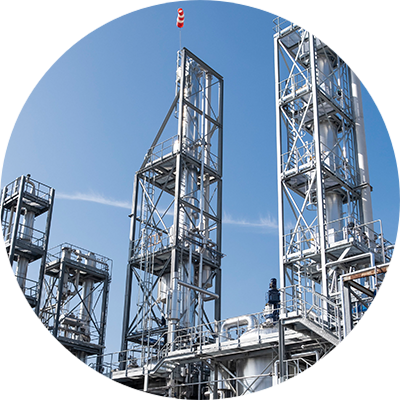Leader in recycling
& recovering of
organic solvents

Sustainability
The principle of circular economy optimizes the raw materials streams as such that materials, components and products stay within a productive supply chain and can generate an added value at every moment.
The processing industry plays an important role in the leadership for sustainability and they are moving from controlling pollution to preventing it.
The goal to do everything to minimize the use of raw materials, to produce less waste and to make the processes as green as possible to lower the environmental footprint and close the circular loop.
Circular economy, and in particular recycling solvent waste streams and purification of speciality chemicals has a positive impact on reducing the economical and environmental costs for companies and be more independent of scarcity of raw materials on the market.
R&D
Since 1980, innovation has been key in our work. With our recognized R&D centre, led by top chemists and engineers, we are able to offer innovative and professional solutions for our clients to be their partner in solvents in a circular economy. We aim to contribute to the world’s most compelling challenges of our time, taking care of our environment by providing sustainable solutions. Our R&D department consists of highly qualified and experienced chemists, investments in reliable installations are made continuously, and strict quality, safety and environmental procedures are in place.
Before starting purifying each stream has to pass an extensive R&D research to determinee which will be the most appropriate installation, the best production parameters to guarantee the necessary quality with the highest yield and the least energy
Before starting purifying each stream has to pass an extensive R&D research to determinee which will be the most appropriate installation, the best production parameters to guarantee the necessary quality with the highest yield and the least energy
Our in-house laboratory has a broad range of high-tech, analytically lab and distillation equipment:
- K-F water determination
- Flash point determination
- Gas chromatograph
- Corrosion testing
- pH determination
- Aspen simulation
- Pervaporation pilot unit
- …
In addition, we have all the necessary environmental authorizations to transport, store and handle waste solvents. All incoming waste and industrial solvents are first screened by our R&D centre before entering any site. Subsequently, every single product will be traced during the whole process and samples of the solvents are being stored for a minimum of six months.


Facts
R&D Facts
4000 Enquiries. Going from rather smaller screening projects to the biggest projects, DNCP has successfully accomplished many R&D projects since 1980.
2 Patents
Thanks to our qualified and hard-working R&D team, we have obtained two patents. One for the purification of acetonitrile ex peptide synthesis (US 2008/0073201 A1) and one for the purification of bio-polymers (US10,113,010 B2).
3 Continents
Although most of our R&D requests are coming from Europe, thus handled in Belgium, we do have projects running in other continents. As such, we do have a range of purified solvents that are sold in numerous countries in Africa and Asia.
Technologies
Different kind of distillation columns and techniques are necessary.
To guarantee the best quality, highest yield and the least production energy it’s necessary to dispose of different columns and distillation techniques. As in many cases (certainly for the pharmaceutical industry) the specifications of the solvents are very severe and for the purified solvents even more strict than for virgin products it’s necessary to use the best available technique and up-to-date installations.
DNCP has established in-house know-how and expertise in a broad range of technologies and processes:
- Batch distillation: Flexible and cost-effective distillation method for smaller volumes, typical campaign size from 3m³ to 250 m³.
- Continuous distillation: Larger campaign sizes between 50-1000 m³ are treated in a continuous way. The residence time inside the installation is also reduced; hence thermal stress on the molecule is lower.
- Pressure swing distillation: Based on pressure dependence of the azeotropic mixture, we can break azeotropes.
- Extractive distillation: By adding an extra well selected solvent, we are able to break azeotropes.
- Short Path distillation: An evaporation technique with minimal travelling distance between evaporator and condenser. This allows very low vacuum, up to 0,02 mbar, creating minimal thermal stress.

